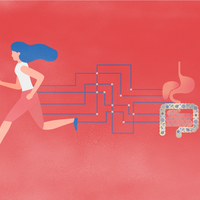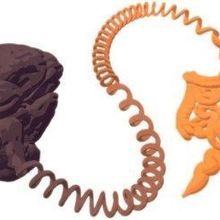Login
Subscribegut-brain axis

Nanoplastic Ingestion Causes Neurological Deficits
Shelby Bradford, PhD | May 31, 2023 | 3 min read
Small plastic particulates can induce inflammatory responses in the gut and brain, but removing them reverses this damage.

A Protein-Rich Diet Helps Mice and Flies Sleep More Soundly: Study
Alejandra Manjarrez, PhD | Mar 24, 2023 | 3 min read
The effect appears to be mediated by a gut-secreted peptide that signals to neurons in the brain that modulate the response to mechanical vibrations.

Science Philosophy in a Flash - A Look at Aging Through Young Eyes
Iris Kulbatski, PhD | Aug 8, 2022 | 1 min read
Aimée Parker shares how her childlike curiosity and collaborative spirit motivate her scientific pursuits.

Through the Looking Glass: Aging, Inflammation, and Gut Rejuvenation
Iris Kulbatski, PhD | Aug 8, 2022 | 4 min read
Renewing the aging gut microbiome holds promise for preventing inflammatory brain and eye degeneration.

Study Links Depression with High Levels of an Amino Acid
Dan Robitzski | Jun 14, 2022 | 5 min read
Experiments in animals and observations in humans suggest that the amount of proline circulating in one’s plasma has a strong association with depression severity.

Bacterial Metabolite May Regulate Cognition in Mice
Sophie Fessl, PhD | Jun 3, 2022 | 3 min read
Microbes in the gut influence the death of support cells in the brain by producing isoamylamine, a study suggests.

Revealing Neuronal Influencers Among the Gut Microbiome
The Scientist | Mar 2, 2022 | 1 min read
In this webinar, Sarkis Mazmanian and Daniel Mucida highlight how intestinal bacteria influence neuronal function and regeneration.

Gut Molecule Linked to Decreased Myelination in Mouse Brains
Angie Voyles Askham, Spectrum | Feb 17, 2022 | 4 min read
A study shows that a molecule produced by intestinal microbes can enter the brain and that its presence is also associated with altered brain connectivity.

Bacteria-Infecting Viruses in Gut Microbiome Linked to Cognition
Dan Robitzski | Feb 16, 2022 | 5 min read
Research in mice and flies suggests that bacteriophages, including those found in dairy foods, may have an influence on an animals’ ability to learn and remember information.

How the Gut Differentiates Artificial Sweeteners from Sugars
Chloe Tenn | Jan 21, 2022 | 5 min read
Signals from sweeteners and sugars are relayed from the gut to the brain by different neural pathways, a new study concludes.

Tinkering with Gut Microbes Boosts Brain Plasticity in Mice
Sophie Fessl, PhD | Jan 13, 2022 | 4 min read
Intestinal bacteria contribute to the effect of stimulating environments on the brain’s ability to adapt, a study concludes.

Diet Implicated in Autism-Microbiome Link
Ruth Williams | Nov 11, 2021 | 3 min read
The unbalanced gut flora present in some people with autism is not a driver of the condition but rather a consequence of eating behaviors characteristic of the condition, a new study claims.

Exercise Changes Our Gut Microbes, But How Isn’t Yet Clear
Ashley Yeager | Aug 15, 2019 | 5 min read
Physical activity, independent of diet, shifts the composition of bacteria in the intestines, spurring researchers to search for species that might provide benefits akin to working out.

Gut Microbes May Play a Role in Mental Health Disorders
Ashley Yeager | Jul 5, 2019 | 4 min read
The gut microbiome has been linked to depression, schizophrenia, and other neurological conditions, but it’s not yet clear whether the relationship is causal.

Mouse Model Shows How Parkinson’s Disease Begins in the Gut
Emma Yasinski | Jun 26, 2019 | 3 min read
Johns Hopkins’s Ted Dawson discusses his lab’s demonstration that misfolded α-synuclein can move from the stomach to the brain and cause physical and cognitive symptoms.

The Gut of Mice Communicates with the Brain Through the Vagus Nerve
Sukanya Charuchandra | Sep 21, 2018 | 2 min read
The researchers who made the discovery suggest the signaling may form a sixth sense.

Opinion: Microbial Mind Control—Truth or Scare?
Katerina Johnson | May 1, 2018 | 3 min read
Normal brain function may have evolved to depend on gut microbes and their metabolites.
